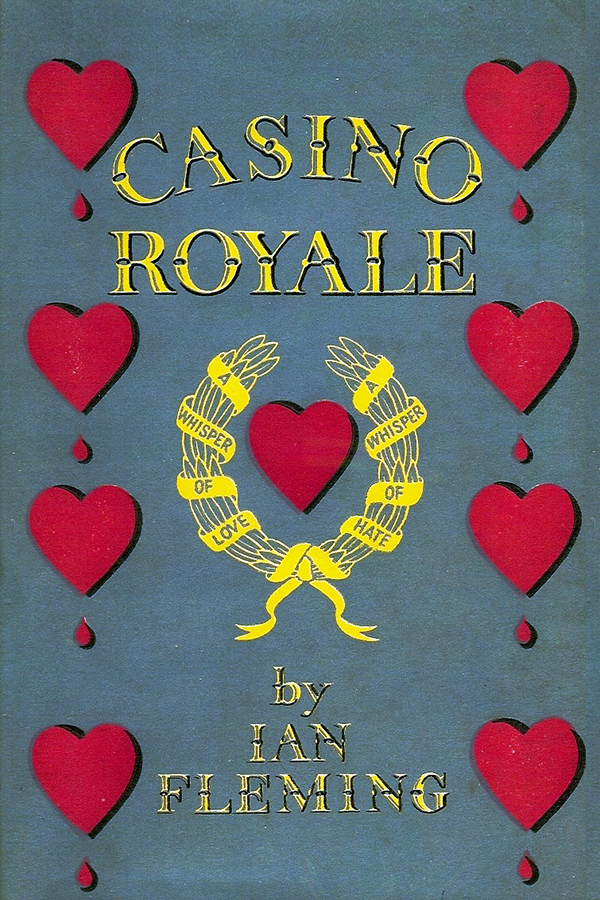Casino Royale
- 28 Apr 2019
- The first James Bond book is good. Real good.

This post contains spoilers.
Impetus & Impression
I’ve re-read Ian Fleming’s first James Bond novel in light of the official announcement of the 25th James Bond movie. The unnamed movie will be Daniel Craig’s fifth and final turn as 007, but his first movie will probably always be his best one. The 2006 franchise-reboot is excellent because, in my view, the story is grounded in reality, like the 1953 book. The movie adaptation is more prominent in my mind because I’ve seen it several times.
Still, the book is enjoyable. I bought it on the cheap a couple of years ago along with The Old Man and The Sea by Ernest Hemingway and Animal Farm by George Orwell. The bookstore had a buy-three-classics-for-one-price deal, so I chose three books that were each written by famous Anglo authors of the mid-twentieth century. Casino Royale, like Orwell’s Animal Farm, was the first notable book by Fleming.
He didn’t exert literary influence as Hemingway did, or produce schoolwork fodder as Orwell did, but I enjoyed Fleming’s book the most among the three that I bought. Because time passed between my readings of Casino Royale, and because I had seen the movie so many times, re-reading the book was almost like a new experience. I appreciate how Fleming has crafted the story even more.
The Book & The Movie
The bomb attack before the casino tournament and the gunpoint threat at the climax of it, neither of which are depicted in the movie, are surprising. Bond’s ruminating about the nature and even the necessity of evil is also surprising. The revelation of Vesper being an accomplice in her staged kidnapping is a detail that I hadn’t noticed during my first reading, possibly because the movie depicts her as a victim of Le Chiffre’s desperation.
The book and the movie are different enough to be interesting for someone who’s already experienced one or the other. The former is set some years after the Second World War, in the early stage of the Cold War, whereas the latter is set a handful of years after the 9/11 attacks. The book has cultural references that place it in a specific period, but I appreciate the timeless sophistication and low-tech ingenuity that it exudes.
For example, the card game of choice is chemin de fer, which is a version of baccarat. It’s much easier to understand than Texas Hold ‘Em, which is featured in the movie because of the popularity of competitive poker at the time. The French origin of chemin de fer makes it exotic, but its simplicity and resemblance to blackjack make it familiar as well. From a storytelling perspective, the author doesn’t need to explain the importance of every hand.
Ironically, the only noteworthy gadgets are used by the bad guys. A pair of would-be assassins carry bombs that are disguised in camera cases, a henchman wields a cane that discretely shoots a bullet a point-blank range, and the villain drives a car that releases a carpet of spiked chain-mail. Bond, on the other hand, only uses a screwdriver and some cleverness to hide his winnings that doom his adversary.
Fleming foreshadows the noteworthy events like the bomb attack, the casino holdup, and Vesper’s suicide. The surprise lies in when and how they happen, but in hindsight, they can generally be anticipated. Fleming’s dialogue for Bond and Vesper in their first interactions is stiff. It’s supposed to be charming and romantic, I think, but it’s awkward and dated. Thankfully, Bond’s inner monologue is readable and memorable (“The silly bitch”).
The book reveals some things that the movie either avoids or changes. As previously mentioned, the book’s Vesper ultimately reveals that she had conspired with Le Chiffre to stage her kidnapping, whereas the movie’s Vesper is truly a kidnapping victim. Bond’s two kills that earn him Double-O status are twice described in the book, and they’re different in the movie. The second kill is described in the official book prequel to Casino Royale.
The book that’s started everything has piqued my interest; I’m curious to know if its sequels use the plot formula that the movies always use. I don’t consider myself to be a Bond fan, but I’m a fan of this book and its movie adaptation. I have faint hope that Bond 25, which is backed by a different studio and helmed by a new director, can meet the quality of Casino Royale and maybe have another legendary tie-in video game to go with it.